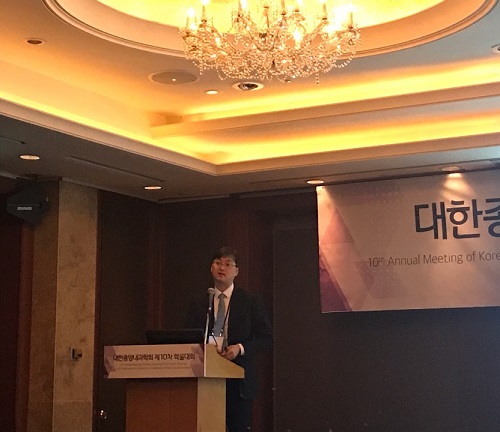Korean insurance policies are lagging behind the development of anticancer therapies, leaving many novel drugs without coverage and creating a population of “medical poor” citizens, an expert said.

Lee Dae-ho, head of the planning committee of the Korean Association for Clinical Oncology (KACO), criticized the government policies at the 10th annual KACO meeting in downtown Seoul Friday.
The development of anticancer therapies has been moving forward at an incredible pace with the U.S. Food and Drug Administration approving novel immunotherapies at a faster rate than ever before, whereas the Ministry of Food and Drug Safety has failed to keep up, Lee said.
Korean health authorities approve a new drug around three years after the U.S. FDA does so, according to data compiled by Lee. After the approval, it takes about 320 days for the same drug to be reimbursed, which is two months longer than other OECD countries. Lee pointed out that no medications approved by the MFDS last year had gained insurance coverage yet.
In the meantime, Korean cancer patients must pay for expensive cancer therapies out-of-pocket. In some cases, cancer patients are not even allowed to use FDA-approved drugs with their own money if it is not approved by the health authorities.
The issue emerged in a recent bout among cancer patients, the Health Insurance Review and Assessment Service (HIRA), and AstraZeneca over a lung cancer therapy, Tagrisso. Cancer patients demonstrated against both the health insurance agency and the pharmaceutical giant for delaying price negotiations of the FDA-approved drug while their lives were at stake.
The lack of access to these therapies has become a hole in the country’s medical system, Lee said.
Until the authorities reimburse cancer therapies, patients must pay a hefty sum for potentially life-saving treatments. These patients have come to be known as “medical poor.” The term, popularized by the KACO, refers to individuals who spend a significant proportion of his or her total income on medical fees, leaving little left for other expenses.
To solve the problem, it is necessary to actively review alternatives and focus on shortening the period of approval and reimbursement, while increasing funds used to cover cancer therapies, Lee said.

